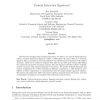Free Online Productivity Tools
i2Speak
i2Symbol
i2OCR
iTex2Img
iWeb2Print
iWeb2Shot
i2Type
iPdf2Split
iPdf2Merge
i2Bopomofo
i2Arabic
i2Style
i2Image
i2PDF
iLatex2Rtf
Sci2ools
117
click to vote
ICISC
2001
2001
Content Extraction Signatures
Motivated by emerging needs in online interactions, we define a new type of digital signature called a `Content Extraction Signature' (CES). A CES allows the owner, Bob, of a document signed by Alice, to produce an `extracted signature' on selected extracted portions of the original document, which can be verified to originate from Alice by any third party Cathy, while hiding the unextracted (removed) document portions. The new signature therefore achieves verifiable content extraction with minimal multi-party interaction. We specify desirable functional and security requirements for a CES (including an efficiency requirement: a CES should be more efficient in either computation or communication than the simple multiple signature solution). We propose and analyze four CES constructions which are provably secure with respect to known cryptographic assumptions and compare their performance characteristics. Key Words. Content-extraction, privacy, fragment-extraction, content bl...
Related Content
| Added | 31 Oct 2010 |
| Updated | 31 Oct 2010 |
| Type | Conference |
| Year | 2001 |
| Where | ICISC |
| Authors | Ron Steinfeld, Laurence Bull, Yuliang Zheng |
Comments (0)

